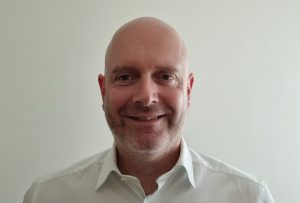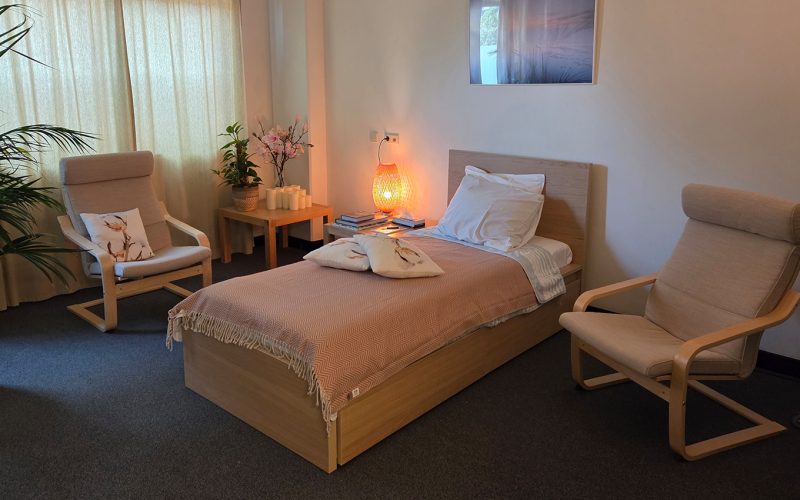Most patients benefit from treatments like psychotherapy, medication, or a combination of both. But for some, these treatments don’t work, or not well enough. Psilocybin, a psychedelic compound found in certain mushrooms, is increasingly mentioned in the media as a potential solution for psychiatric conditions. Psychiatrist Metten Somers at UMC Utrecht is studying the effects of psilocybin in patients with treatment-resistant depression. He is hopeful, but cautious: “We haven’t proven anything yet.”

Metten Somers
In his consultation room, Metten often sees patients with severe depression. “These people are really suffering. Their joy in life fades, and social connections lose meaning. It’s tough on their loved ones, too.” Finding the right treatment is often a process of trial and error. “That journey can be difficult and frustrating, especially for those with treatment-resistant depression.” This is why Metten and his team are studying whether a carefully guided psychedelic experience induced by psilocybin could help. “It would be wonderful if we could eventually offer this as an additional treatment option.”
Interest in psychedelics in psychiatry isn’t new. In the 1950s and 60s, scientists conducted extensive research on substances like LSD and psilocybin. These drugs were nearly accepted into mainstream psychiatry. Until governments started fearing their social impact. The U.S. government in particular introduced strict laws, leading to the global ‘war on drugs’ in 1970. Research on psychedelics came to a standstill.
Metten has long been intrigued by the potential role of psychedelics in treating psychiatric conditions. But during his psychiatry training (2004–2011), the topic was still taboo. “I realized just how strong the stigma around psychedelics was. I found it unfortunate that psychiatry had abandoned them entirely.” Over time, the scientific view shifted. “We kept hoping neuroscience would eventually explain everything, but progress stalled. That renewed interest in older compounds. Around 2016, new studies appeared on psychedelics in psychiatry. Public interest grew, and risks turned out to be lower than expected. Classic psychedelics like psilocybin are, for example, not addictive.”
A hospital room, but less clinical. There’s a Van Gogh print on the wall, soft lighting, cushions, plants, books, and a bed. Here at UMC Utrecht, participants ‘trip’ under the supervision of two trained therapists. “We prepare participants thoroughly beforehand,” Metten explains. “Each is randomly assigned a low, medium, or high dose of psilocybin. Neither participant nor researcher knows which dose is given. During the session, participants wear an eye mask and listen to a specially curated playlist that guides them through the stages of a psychedelic experience.” A session typically lasts six to eight hours. Therapists stay with the participant the entire time. “A psychedelic experience can be intense. A safe environment is essential. It can bring new insights or a shift in perspective.”
After the session, participants engage in debriefing conversations. “We go through the experience together. What themes came up? What moved them? Post-session support is essential, especially for those who don’t benefit. Disappointment or difficult emotions can arise.” Several weeks later, a second psilocybin session follows, again with extensive guidance. Participation lasts about one year. Metten is impressed by the participants’ commitment. “They’ve often tried everything. Their courage gives us a sense of responsibility to support them properly.”
UMC Utrecht’s study builds on earlier international research with promising results: in one study, almost 30% of participants who received 25 mg of psilocybin experienced complete, though in some cases temporary, relief from depression. This is the highest of the three doses tested and typically induces a strong experience. The fact that this group saw such rapid and lasting relief from a single dose is remarkable. The key question now: will these results hold up in larger groups and over time?
Metten’s team is part of a broader international study sponsored by Compass Pathways, involving researchers in the US, Canada, the UK, and several European countries. In the Netherlands, UMC Utrecht collaborates with the LUMC, and UMCG is also participating. “We must thoroughly assess the safety and effectiveness of this treatment,” says Metten.
So, will we have an effective treatment for hard-to-treat depression within a few years? Metten remains cautious. “The media often highlight only the positive effects of psychedelics. But psilocybin is no miracle cure. We must avoid giving false hope.” That’s why Metten and colleagues from the Platform Psychedelica in de Psychiatrie, part of the Dutch Psychiatric Association, wrote a guidance piece for mental health professionals. It provides information on the current status of psychedelics in psychiatry. “Right now, treatment with psilocybin is only possible within clinical trials. Not everyone qualifies. For example, people who have recently used psilocybin on their own cannot participate. Using psychedelics without professional support carries risks and can worsen symptoms. I strongly advise against self-medication.”
If Metten’s study yields positive results, Compass Pathways may apply for regulatory approval to bring psilocybin to market. “It would be a big step forward for patients who haven’t responded to medication or therapy. We’re also exploring whether psilocybin might help people suffering even more severely, such as those with treatment-resistant depression who are considering euthanasia.” A breakthrough in psilocybin research could offer renewed hope to those who have exhausted all other options and may even transform the way we view psychiatric treatment.
Psilocybin isn’t the only psychedelic being studied in psychiatry. There’s also significant research into MDMA for post-traumatic stress disorder. Esketamine, a derivative of ketamine, is currently the only psychedelic approved as a prescription medication in the Netherlands. MDMA and esketamine are ‘atypical psychedelics’ and differ in structure and effect from classic psychedelics like psilocybin and LSD. For most substances, their effectiveness still needs to be proven in the coming years.
Feel free to contact the study team at: ptrd@umcutrecht.nl.
